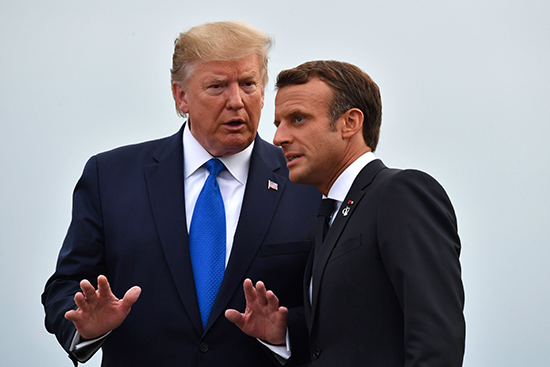G7峰会:几家欢喜几家愁

|
干了吧,红酒爱好者们。举起庆祝的酒杯,因为一些你所钟爱的红酒并没有陷入特朗普总统发起的这场不断扩大的贸易战。 然而,科技巨头们可能只有袖手旁观的份。 8月26日,G7峰会在其本土的比亚里茨刚刚闭幕,27日,法国红酒行业很快便开始为“无税”胜利而欢呼,虽然这种庆祝只是昙花一现。就在几天前,事情看起来并不是很明朗,当时,特朗普在新闻发布会上再次威胁对法国红酒征收报复性关税,除非法国政府放弃对科技巨头征税。 有关红酒制造商不幸发现自己被卷入有关互联网和科技公司税收问题的事实,反映出了当前全球贸易协定存在的不确定性。 科技公司税收似乎引发了美国对其他法国产品报复性制裁,包括红酒。美国官员和法国财政部长布鲁诺·勒梅尔曾经于本周末在法国就该问题达成了某种共识。勒梅尔向法国电视台LCI透露:“在比亚里茨会晤之前,这个威胁是真实存在的,法国红酒差点就遭遇关税打击。在比亚里茨会晤之后,这一威胁不复存在。” 法国葡萄架和烈酒出口行业协会FEVS(法国葡萄酒与烈酒出口联盟)于8月27日在法国向记者发布了一则声明,称自己对红酒制造商在峰会中逃过新税一劫而感到“十分高兴”,并对法美外交大唱赞歌,称其“成功避免了一切阻碍国际贸易的行为,尤其是法国红酒在美国市场的准入问题,因此标志着双方在缓解贸易紧张局势方面迈出了重要的一步”。 然而,代表科技行业的贸易团体则抱怨说,美国谈判者相当于给马克龙政府开了“绿灯”,因为其未能说服法国政府撤销其科技公司征税。 计算机与通讯行业协会会长兼首席执行官艾德·布拉克在一则提供给《财富》杂志的声明中说:“法国针对美国首要公司的单边数字税行动是不公平的,对这种行为的漠视将鼓励其他国家效仿其做法。尽管我们存在众多的疑问,而且也在等待更多的细节浮出水面,但在当前看来,这个‘协议’更像是投降而不是妥协。” 确实,包括意大利和英国在内的其他增速缓慢的G7成员国,正在密切观望法国的数字税,而且正谋划推出自身的征税方案。 对本土科技跨国公司数字业务征税的势头在今后将不断加大,而且正在朝经合组织国家蔓延。这个在G7峰会外围活动达成的原则性协议要求法国向科技公司发放某种课税津贴,金额为法国税收与经合组织国家最终征收的任何税收之间的差额。 法国对科技公司的征税于上月生效,额度为法国公司数字业务营收额的3%。该税种的门槛为全球数字业务营业额不低于7.5亿欧元或法国数字业务营业额不低于2500万欧元的任何企业,广告,电商和数据处理等行业均适用。当地把这一税种称为GAFA,也就是预计受该政策冲击的一些超大型公司的首字母缩写:谷歌(Google)、亚马逊(Amazon)、Facebook和苹果(Apple)。 与此同时,法国红酒制造商则在纷纷开瓶庆祝。该国132亿欧元(约合147亿美元)的红酒行业是全世界最大的红酒产业之一,而美国又是法国首要的出口市场。FEVS称,在2019年上半年,法国向美国出口的红酒和烈性酒达到了18亿美元,接近去年全年的总额。(财富中文网) 译者:冯丰 审校:夏林 |
Go ahead, vinophiles. Raise a celebratory glass knowing that some of your favorite wines haven’t yet been dragged into President Trump’s ever-expanding trade war. Big Tech though just might sit this one out. The French wine industry on August 27 was quick to hail a “no-tax” victory—even if it proves shortlived—a day after the G7 Summit wrapped up on its home turf in Biarritz. Things looked uncertain just a few days ago when Trump, in a press conference, once again threatened a retaliatory tariff on French wine unless the French government backed off taxing tech giants. That winemakers even found themselves embroiled in a dispute over a tax on Internet and technology companies speaks volumes about the uncertainty of global trade pacts these days. Once in France this weekend, U.S. officials and French Finance Minister Bruno Le Maire achieved a kind of détente on the tech tax that seems to knock off the table retributive sanctions on other French products, including wine. “Before Biarritz, the threat was real, we were close to getting hit with a tariff on French wine,” Le Maire told French TV station LCI. “After Biarritz the threat has receded.” France’s wine and spirits export body (FEVS) issued a statement in French on August 27 to journalists that it was “delighted” its winemakers survived the summit with no new tax constraints. It praised the Franco-American diplomacy, making “it possible to avoid any action hindering international trade, in particular the access of French wines to the American market, and thus marks an important step towards reducing trade tensions,” according to the statement. A trade group representing the technology industry, however, grumbled that American negotiators gave the Macron government the equivalent of a “free pass” in failing to convince it to rescind the levy. “France’s unilateral digital tax action aimed at leading American companies is unjustified, and if tolerated, will encourage other countries to follow their example,” said Ed Black, President & CEO of the Computer & Communications Industry Association, in a statement shared with Fortune. “While we have many questions and await more details, it currently appears that this ‘agreement’ would be more capitulation than compromise.” Sure enough, other slow-growing G7 members, including Italy and the United Kingdom, are watching the French digital tax closely with designs on ratifying a version of their own. The future of taxing the domestic digital businesses of tech multinationals is gaining momentum and heading for the OECD. The agreement reached in principle on the sidelines of the G7 summit calls for France to issue a kind of tax credit to tech companies for the difference between the French tax and any levy ultimately drawn up by the OECD. France’s levy on tech companies went into effect last month. It imposes a 3% tax on companies’ digital revenues in France. It applies to any company that makes at least €750 million globally and €25 million in France from digital business whether it be advertising, e-commerce or data handling. The levy is known locally as GAFA, an acronym for the biggest of the companies expected to be impacted by the new measure: Google, Amazon, Facebook and Apple. Meanwhile, French winemakers were popping corks. The country’s 13.2 billion euro ($14.7 billion) wine sector is one of the biggest in the world, and the U.S. is France’s leading export market. According to FEVS, in the first half of 2019, exports of French wines and spirits to the United States reached € 1.8 billion, on pace to surpass last year’s haul. |













